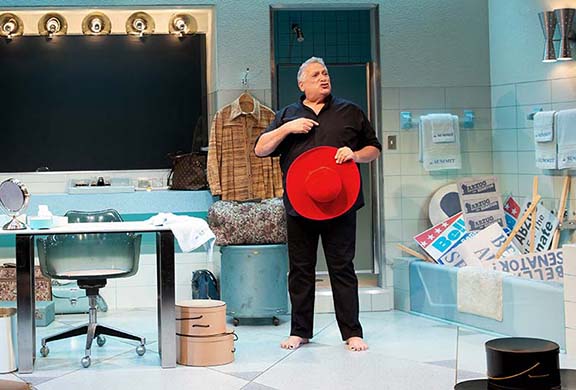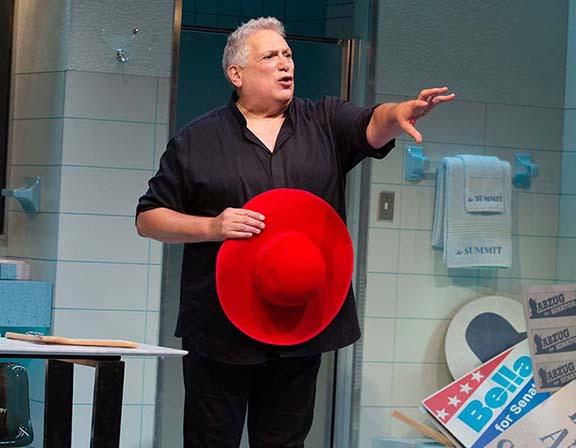By Lucy Komisar
I knew Bella Abzug, so my reaction to this play is deeper and more personal than it might otherwise be. I started out wondering how a guy could create the story of a feminist woman. Would this slip into drag?
Well, no. In fact, Harvey Fierstein wears a black shirt and pants, so there‘s not a hint of drag. Under the direction of Kimberly Senior, he creates a Bella Abzug of wit and toughness, quite recognizable to those of us who knew her. And he has done a superb job of presenting the vision and politics of a woman whose accomplishments still are not recognized by the mainstream. And in her own words, gleaning from her writings and interviews.

We‘re at the Summit Hotel on Lexington Avenue — not expensive by Manhattan standards – 2am primary night 1976. In a very large bathroom, very unlikely for the Summit, but never mind. She needs to be set apart from her entourage, family, staff, supporters, in the main room. The bathtub is filled with campaign signs.
She is thinking, talking as if to Mim (her long-time friend and aide Mim Kelber). Why chance her House seat with a run for the Senate. She had a small staff in the House. “In the Senate, with a staff of 80, we can change the world.” And a pun: “A stag Senate is stagnation.”
She dreams of a woman president, and cabinet, but with good politics. She reminds us that FDR did nothing to end the holocaust. Kennedy was another patrician: Hello Vietnam. Nixon vetoed child care.
And reminiscence. “We wore black arm bands to protest World War I.”
When she applied to Harvard Law School, they said we don‘t accept women. So, she went to Colombia on a full scholarship to study labor law. She was law review editor. When she looked for a job, she was asked, “How many words can you type?”
The secret of Bella‘s hats. At an office, she‘d say, “Hello. I‘m Bella Abzug and I‘m with the law firm of so and so.” “Yes, we heard you but we‘re waiting for the lawyer.”
“Clearly I had a problem. At that time only two percent of the bar were women so, to them, I must have been a secretary or clerk. But then my darling Martin suggested that a secretary would never appear in a hat and gloves, only a professional woman would. So, from then on, if I was on duty, I wore a hat and gloves.”

I didn‘t know that in the 1940s, she was chief counsel for Willie McGee, a black man in Mississippi accused of rape for having a consensual affair with a white woman. He was sentenced to death, and she spent two years fighting his appeal.
She recalled, “Death threats were my daily greeting. The editorial pages said they should fry McGee‘s white woman lawyer along with him. Restaurants wouldn‘t serve me food. Hotels wouldn‘t rent me a room. I ate out of candy machines and slept upright on a bench in the bus station. One night, having no safe place to sleep, I hid in the ladies‘ room at the courthouse, lifting my feet up every time the guards came through.”
She won a Supreme Court reversal. He was indicted again. Another reversal, another indictment. Major national figures begged President Truman for clemency. But the state of Mississippi electrocuted Willie McGee. Bella, eight months pregnant, miscarried.
The family moved to Mount Vernon, where Martin had grown up. In 1949, she went to the famous Paul Robson concert in nearby Peekskill. Robson had earlier that year asked Truman for an anti-lynching law; the president said it wasn‘t time.
“Martin, my sister Helene and I got into the car and drove off to the concert. We drove right into a mob of hoodlums and KKK members hurling anti-communist, anti-black and anti-Semitic epithets at the concert goers. They were also throwing rocks, one of which smashed right through our windshield.”
Martin spun the car around and got us out of there. As we raced away, I saw a cross burning on a nearby hill surrounded by Klan members in hoods and robes, a circle of State Troopers protecting them. When Martin finally stopped the car we realized I was covered in blood. The rock had hit me in the forehead.”
In the 50s, she knew theater people Zero Mostel, Jack Guliford, Lee Grant who pled the Fifth Amendment at the McCarthy witch-hunt hearings.
In the 60s, “I show up at the next meeting of Women‘s Strike for Peace and warn them, “No one in Washington is going to listen to a bunch of housewives crying over poisoned milk. You have to lobby systematically….And, wham, say hello to their new Legislative and Political Action Director.”
Robert Kennedy called her when he began to oppose the war. But he was killed and the stage moved to Chicago, where ten thousand anti-war protesters massed against Hubert Humphrey. “Devastating,” she thought, “a pro-war candidate…They kept crying for change and we gave them some recycled crap.”
Forward to Congress: She would propose the first resolution against the war, “be it resolved by the House of Representatives, that the President set a date for the complete and systematic withdrawal of all forces no later than July 4th, 1971.”
At the end, four million Laotians Cambodians and Vietnamese were dead and 68,000 Americans. “For what? Only male ego keeps war going.”
“They stuck me on a sub-committee no one else wanted – Government Information and Individual Rights. You want to know how unpopular it was? They made me chair. Big mistake. I discovered a resolution that hadn‘t been heard in twenty-seven years and used it to release hidden documents to the floor of the House. The Republicans were so scared that they tried to vote on it while I was out of the room.
Another Congresswoman objected, “Your mother waited nine months for you. You can wait five minutes for Mrs. Abzug.” So, did I get my vote? Of course, I got my vote. And that vote put The Pentagon Papers into the Congressional Record.”
“Did you know that I was turned down for an American Express card? I was a seated member of Congress and they told me I had to get my husband‘s permission….So, we passed a law giving women the right to have their own credit histories… and credit cards.”
And now to run for the Senate. After she won the party convention, the political bosses delayed the primary to let her opponents find another challenger. They find Daniel Patrick Moynihan, a Harvard professor and UN ambassador who had served three Republican administrations.
“I have Moynihan Jew-baiting me! He claims that I hate Israel because I opposed selling them fifty war planes. It‘s true, I did. But not because I‘m anti-Israel. I‘m anti-war, you putz!”
The New York Times‘ editorial board voted to endorse me. But its publisher, “Punch” Sulzberger was always backing Moynihan.” He pulled the endorsement. “Moynihan is the only candidate who can stop this radical woman from getting the nomination and eventually losing to Buckley.” The head of the editorial page wrote a letter and even resigned in protest.”
“I‘m going to lose by less than one percent because that momzeh Sulzberger put his thumb on the scale.”
Bella puts on her hat, acknowledges the audience with a clenched fist of defiance, smiles and exits.
A very moving story, an excellent performance by author Fierstein, and a monologue that should be delivered throughout the country.
“Bella Bella.” Written by Harvey Fierstein; directed by Kimberly Senior. New York City Center Stage I, 131 West 55 Street, NYC. 212-239-6200. Opened Oct 22, 2019; closes Dec 1, 2019. Running time: 1 hour 30 minutes. 11/24/19. Also on NY Theatre Wire.

